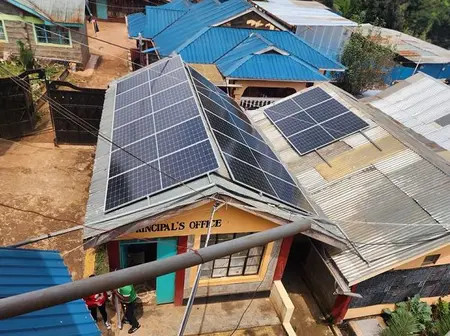In a quiet village on the outskirts of Karatina, Nyeri County, Ndima Kanini Academy is proving that education and sustainability can go hand in hand. Long celebrated for its strong academic record, the school is now drawing attention for its bold embrace of clean energy solutions through KCB Bank’s Clean Energy Schools Project.
With over 1,349 learners, nearly 700 of them boarders, the institution has made a remarkable shift towards green living. Spread across four acres, the academy now runs on solar power, with a borehole, lighting, and even cooking facilities all supported by renewable energy.
“We procured 15 solar panels under the KCB Clean Energy School Project, had them installed, and now we can power the water system, light up the school, and even support cooking,” said an elated Lincoln Njogu, Director of Ndima Kanini Academy. He noted that the project has significantly reduced the school’s water pumping and power costs while ensuring uninterrupted learning for students, day and night.
But the impact extends far beyond electricity savings. More than 90 percent of Kenyan schools still rely on firewood for cooking and heating, consuming at least 1.3 million metric tons annually, worth an estimated Sh20 billion. According to KCB Karatina Acting Manager, Tim Bett, the education sector alone accounts for over 10 million trees felled every year to fuel school kitchens.
“The reliance on firewood makes schools a major driver of deforestation,” Bett explained. “Through green financing, we offer solutions like solar energy, biogas, and LPG. At Ndima Kanini, we’ve partnered with them for a purely solar-driven project over the past two months.”
The consequences of firewood dependency are severe — from accelerated climate change and deforestation to smoke-related health risks in poorly ventilated kitchens. At the same time, schools face the burden of rising firewood costs.
KCB’s Clean Energy Schools Project seeks to break this cycle. By offering tailored green financing, the bank helps schools access sustainable technologies, including solar-powered cooking and lighting, steam-based cooking systems, LPG kitchens, and biogas solutions that transform organic waste into energy.
“The borehole project is now 100 per cent complete, while lighting is in its final stages,” Bett added. “For Ndima Kanini, this translates into a complete saving on their power bills.”
Ndima Kanini Academy’s transformation is a clear signal: the future of education in Kenya is not only about academic excellence but also about leading the charge in environmental stewardship.

Leave a Reply